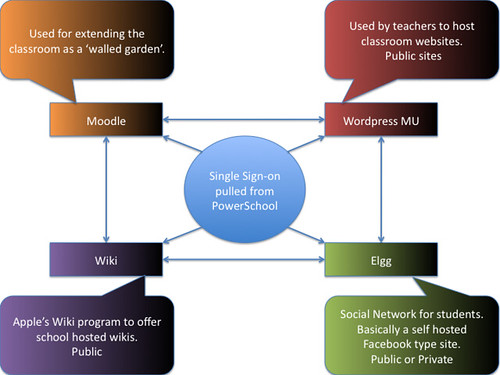OLDaily
by Stephen Downes
October 13, 2008
My Digital Identity
In this address to the 2008 e-Portfolio Conference I consider the sorts of questions that might be asked about a student's identity in an e-portfolio system and the factors that inform the answers to those questions. Rather than being answered with a simple physical presence, as we might have expected in the past, the question of identity in a digital space requires a complex answer, taking into account a person's past and future states, as well as his or her motivations, desires and expectations. Accordingly, an identity is best thought of as a distributed profile, written by multiple authors and considering multiple questions, rather than a single fixed point on which attributes may be assigned.
Stephen Downes,
Half an Hour,
October 13, 2008 [Link] [Tags: E-Portfolios]
[Comment]
Rendering Knowledge
A few statements on knowledge, each of which is innocuous on its own, bt which together would force most people to revise their understanding of knowledge. Like this: "We evolved to handle unstructured fragmented fine granularity information objects, not highly structured documents. People will spend hours on the internet, or in casual conversation without any incentive or pressure. However creating and using structured documents requires considerably more effort and time. Our brains evolved to handle fragmented patterns not information."
Dave Snowden,
Cognitive Edge,
October 13, 2008 [Link] [Tags: none]
[Comment]
Academia.Edu: A Social Network for Faculties, Researchers and Students
Academia.edu is, in its own words, "a tree of academic around the world". The tree in question is a Flash liting of all universities, all departments and all satff (or will be, once they've all added themselves). I really don't think the designers of this site have thought through how large their tree will be and how hard it will be to find - and usefully refer to - an individual leaf. This post is a summary of the site.
Malinka Ivanova,
eLearning 2.0 Technologies and Concepts,
October 13, 2008 [Link] [Tags: Academia]
[Comment]
How Much Do Top Tier Bloggers and Social Media Consultants Get Paid? We Asked Them!
Interesting overview of what top-flight bloggers earn and on what those earnings are based. The main lesson for me, given the amount of work involved, is to find some other work. The most money is made by the consultants, those who ue their blogs as a calling card rather than their main income. The least is made by the journalist-bloggers, those who derive an income solely from their own reporting and writing.
Marshall Kirkpatrick,
ReadWriteWeb,
October 13, 2008 [Link] [Tags: Blogger, Google, Web Logs]
[Comment]
E-Learning for Newbies
The Learning Circuits Blog asks, as its question of the month, what advice would you give to someone new to the field of e-learning. "Where do you start? (What) particular tools you should explore? (What) resources you should read (and) videos/screencasts you should watch? What would your To Learn List look like?" Janet Clarey offers a detailed response. Wendy Wickhar also responds. Me, I'd probably start over again by doing what I did last time: studying philosophy.
Janet Clarey,
Brandon Hall Research,
October 13, 2008 [Link] [Tags: Online Learning, Video]
[Comment]
First Quarter Reflection

I had a critic the other day state that they couldn't understand how the question of identity informs the design of e-portfolios. To me, the connection is perfectly clear and obvious, but iot it isn't to you, this diagram from Jeff Utecht might help. Simply substitute 'OpenbID' for 'PowerSchool' and you have an idea of how a single identity links four separate educational domain s.
Jeff Utecht,
The Thinking Stick,
October 13, 2008 [Link] [Tags: Schools, Online Learning, E-Portfolios, Flickr]
[Comment]
An Introduction to REST
Every once in a while I mention Representational State Transfer (REST) and skip over the bit that tells you what it is. This video is a 14 minute explanation of the concept.
Joe Gregorio,
BitWorking,
October 13, 2008 [Link] [Tags: Video]
[Comment]
The Forbidden City
We're beginning to see what was predicted in the early days of online learning, an increasing (and increasingly expensive) use of animation to explain difficult concepts or help students explore new worlds. The Forbidden City is a $3 million project by IBM. On the less expensive front, there is this animation of the Universal Declaration of Human Rights. On another site, we have Amazon's Mechanical Turk being used to generate instant survey responses to moral survey questions. There's also a new gaming system being used to teach math in New York. And finally, a clickable Slidehare primer on the subprime crisis (language warning).
Various Authors,
Website,
October 13, 2008 [Link] [Tags: Online Learning, Gaming, Project Based Learning]
[Comment]
Textbook Torrents Closes
Jim Groom reports "Textbook Torrents has closed shop just three months after it found itself in the spotlight thanks in part to Jeffrey Young's Chronicle article Textbook Piracy Grows Online, Prompting a Counterattack From Publishers and suggests "its closing begs the question of whether or not the hydra effect will come into play. This site has been shut down, but will three more re-emerge in its stead?"
Jim Groom,
bavatuesdays,
October 13, 2008 [Link] [Tags: Books]
[Comment]
This newsletter is sent only at the request of subscribers. If you would like to unsubscribe,
Click here.
Know a friend who might enjoy this newsletter? Feel free to forward OLDaily to your colleagues. If you received this issue from a friend and would like a free subscription of your own,
you can join our mailing list. Click here to subscribe.
Copyright 2008 Stephen Downes
Contact: stephen@downes.ca
This work is licensed under a
Creative Commons License.